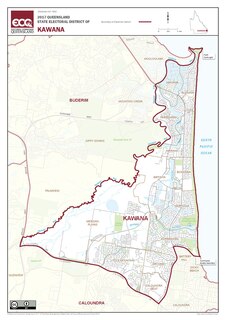Kāwanatanga is a word from the Māori language of New Zealand. Kāwanatanga was first used in the Declaration of Independence of New Zealand, 1835. It reappeared in 1840 when the Treaty of Waitangi was being translated from English into Māori. It was used there to translate the concept of sovereignty. Some historians believe that there was no existing suitable word in the Māori language at the time; however, many Māori believe that the word mana would have provided appropriate meaning. One supposition is that if mana had been used instead of the new, transliterated kāwana tanga, the treaty would never had been signed.
The following lists events that happened during 1926 in New Zealand.
Nicola Kawana is a New Zealand actor, best known for playing Huia Samuels on the longest running New Zealand television series Shortland Street. Other roles include Mercy Peak, Jackson's Wharf and Lollie in The Man Who Lost His Head.

Kawana is an electoral district of the Legislative Assembly in the Australian state of Queensland. Based on the Sunshine Coast, the district has been held by both sides of politics over its short history.

Buddina is a suburb of the Sunshine Coast Region, Queensland, Australia.

Bokarina is a coastal suburb of Sunshine Coast Region, Queensland, Australia, located within the Kawana Waters urban centre.

The Dictionary of New Zealand Biography (DNZB) is an encyclopedia or biographical dictionary containing biographies of over 3,000 deceased New Zealanders. It was first published as a series of print volumes from 1990 to 2000, and then on a website from 2002. The dictionary superseded An Encyclopaedia of New Zealand of 1966, which had 900 biographies. The dictionary is managed by the Ministry for Culture and Heritage of the Government of New Zealand. An earlier work of the same name in two volumes, published in 1940 by Guy Scholefield with government assistance, is unrelated.

Sunshine Coast Stadium is a multi-sport venue located at Kawana Waters on the Sunshine Coast, Queensland, Australia. The stadium is the main venue in a sporting precinct that also includes seven fields.
Atareta "Dina" Carol Maxwell, born Atareta Morrison was a kapa haka leader.
Mariko Kawana began the most notable phase of her life as a Japanese model and actress who has appeared in softcore pink film and V-Cinema, and who has also been a hardcore adult video (AV) performer and director. She was one of the earliest AV actresses in the "mature woman" or "madame" (jukujo) category of performers. She is now retired as an actress and has returned to her pre-acting career as a writer.
Kiti Karaka Riwai was a New Zealand tribal leader. Of Māori and Moriori descent, she identified with the Ngati Mamoe iwi. She was born in Ruapuke Island, Southland, New Zealand in 1870. Her first husband was Riwai Te Ropiha, a Moriori of the Chatham Islands, with whom she had nine children. Her second husband was Te Ao Ahitana Matenga of Ngāti Kahungunu, with whom she had one child, Joey Ashton.
Tipi Tainui Ropiha (1895–1978) was a notable New Zealand surveyor, senior public servant. Of Māori descent, he identified with the Ngāti Kahungunu and Rangitāne iwi. He was born in Waipawa, New Zealand, in 1895. Rina Winifred Moore was his daughter.
Isabella Flora Siteman was a notable New Zealand domestic servant, farmer and philanthropist. She was born in Ninewells, Angus, Scotland in about 1842.
Rina Winifred Moore was a New Zealand (medical) doctor. She was the first female Maori doctor. Of Māori descent, she identified with the Ngati Kahungunu, Rangitane and Te Whanau-a-Apanui iwi. She was born in Auckland, New Zealand on 6 April 1923. Her father was Tipi Tainui Ropiha.
Alfred Augustus Grace was a New Zealand teacher, journalist and writer. He was born in Auckland, Auckland, New Zealand on 1867.
Kawana is a surname. Notable people with the surname include:

Peeni Ereatara Gladwyn Henare is a New Zealand Labour Party politician who has been a member of the New Zealand parliament for the Tāmaki Makaurau Māori electorate since the 2014 general election.

The Kawana flour mill near Matahiwi was built in 1854, and is the last remaining flour mill on the Whanganui River and the only remaining 1850s mill machinery in New Zealand.
Wendy Ruth Hawke is a New Zealand adoption advocate. She has been the executive director of ICANZ since 1995. In 2014 she was made an Officer of the New Zealand Order of Merit for her services to inter-country adoption.







